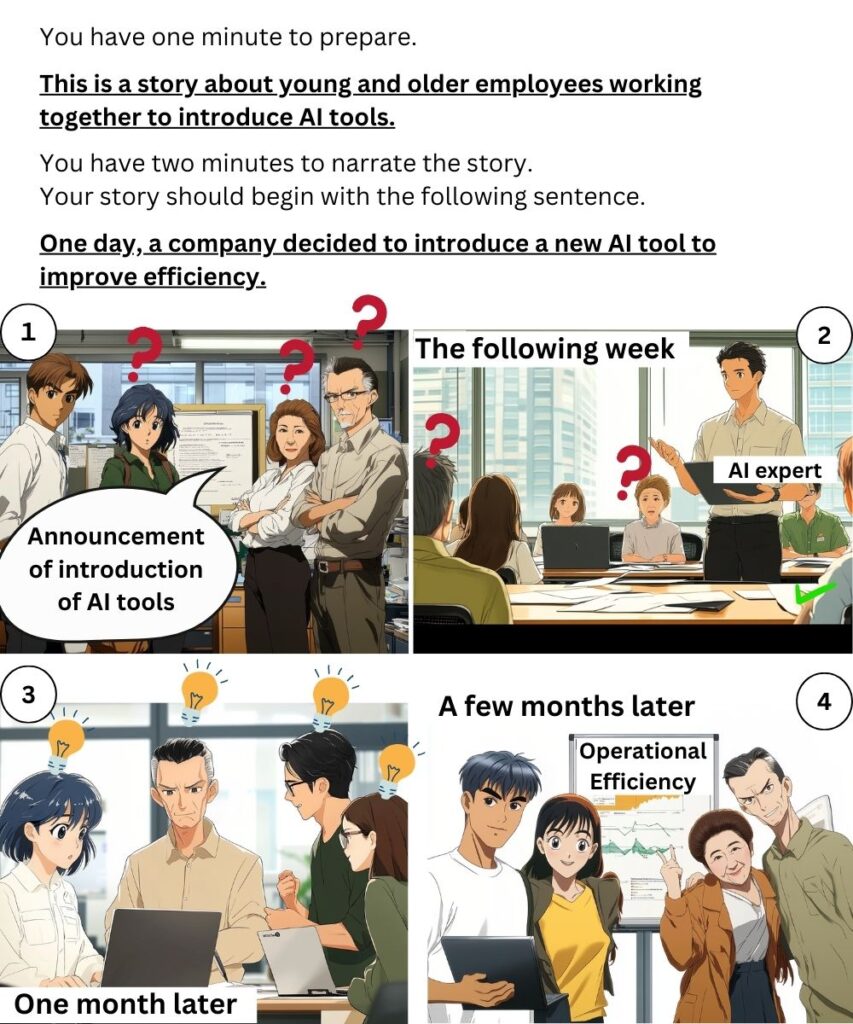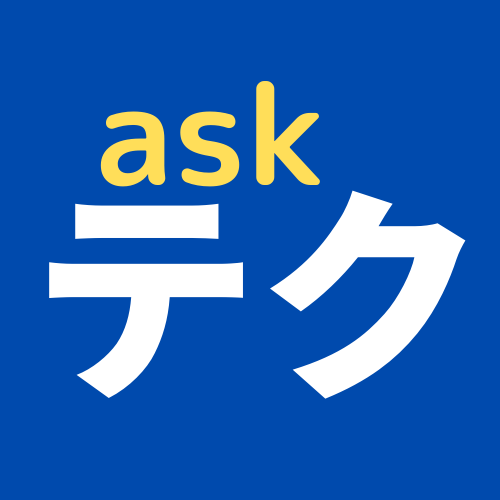実際の出題形式(問題カード)で英検準1級の面接練習を独学できるページです。
2024年度リニューアル対応!
所要時間:概ね8分
質問概要
ナレーション内容を考える(1分間)
イラストの内容を説明するナレーションを考える
ナレーション(2分間):ナレーションを始める
※2分以上続く場合は、途中でも中止させられるので注意
Q&A(No. 1):イラスト関連の質問
イラストに関連した質問。「問題カード」を見ながら解答できます。
※登場人物が考えている事などを聞かれます。
Q&A(No.2, No. 3)
問題カードに関連した、受験者の意見を問う質問
Q&A(No. 4)
問題カードのトピックに少し関係のある質問。受験者の意見を問う質問
※この<No. 4>質問文に「導入文」が追加されました。
問題カード

ナレーションと質問
ナレーション指示
<指示>Look at the pictures carefully and read the directions silently for one minute.(1分間)
<指示>Now, please begin your narration.(2分間)
Question No.1
Please look at the fourth picture. If you were an older employee, what would you be thinking?
Question No.2
Do you believe that new technologies are beneficial for employees of all ages?
Question No. 3
Do you think that fewer people are interested in learning new technologies as they get older?
Question No.4
In recent years, there has been growing awareness of digital literacy and upskilling. Do you think that companies should invest more in training their employees in new technologies?
質問音源チャレンジ
本番のように、英語の質問を聞いて答える練習をしてみましょう。
ナレーション準備
ナレーション開始
Question 1 mp3
Question 2 mp3
Question 3 mp3
Question 4 mp3
解答例
ナレーション例
<1> One day, a company decided to introduce a new AI tool to improve efficiency. When the 1. One day, a company decided to introduce a new AI tool to improve efficiency. When the employees received the announcement, they were unsure if the AI tool would actually be useful in their daily work.
ある日、会社が効率を向上させるために新しいAIツールを導入することを決定した。AIツール導入のお知らせを見た社員は、実際に役に立つのかどうか分からなかった。
「actually = 実際に」のような、ちょっとした副詞を意識的に使って得点を稼ごう!
<2> The following week, the company arranged a training session with an AI expert. Despite the expert’s detailed explanations and numerous documents provided, some employees still struggled to understand how to use the tool effectively.
翌週、同社は AI の専門家によるトレーニング セッションをアレンジしました。専門家による詳細な説明と多数の資料が提供されたにもかかわらず、一部の従業員は依然としてツールの効果的な使用方法を理解できずにいました。
「struggled to understand = 理解するのに苦労した」のように、「struggle」を使うと、苦戦する様子が表せるね
<3> A month later, as employees began using the AI tool on their computers daily, they gradually learned how to operate it and started to see its benefits. Over time, all employees became proficient in using the tool, realizing its impact on their work.
1 か月後、従業員は毎日コンピューターで AI ツールを使い始め、徐々に操作方法を学び、そのメリットを理解し始めました。時間が経つにつれて、すべての従業員がツールの使い方に習熟し、仕事への影響を実感するようになりました。
<4> Several months later, the company successfully integrated the AI tool into its operations. Both younger and older employees had mastered the tool, leading to a significant increase in productivity. Everyone was satisfied with the new tool, and teamwork improved as a result, creating a more collaborative and efficient workplace.
数か月後、同社は AI ツールを業務にうまく統合しました。若手社員もベテラン社員もツールを習得し、生産性が大幅に向上しました。全員が新しいツールに満足し、結果としてチームワークが向上し、より協力的で効率的な職場が生まれました。
生産性向上、チームワーク向上、協力的な職場(Increased productivity, teamwork and a collaborative workplace)、など使えそうな表現はしっかり押さえておこう。
Question 1 解答例
質問:4枚目の写真を見てください。あなたが高齢社員だったら、何を考えていますか?
If I were an older employee, I would feel a mix of relief and accomplishment. I would be relieved that I finally understood how to use the AI tool, and proud that I could contribute to the company’s productivity. However, I might also feel a bit tired from the effort it took to learn something new.
もし私が高齢社員だったら、安堵感と達成感を感じるだろう。やっとAIツールの使い方が分かり、会社の生産性に貢献できることを嬉しく思うだろう。しかし、新しいことを学ぶのに苦労したため、少し疲れているかもしれない。
「ほっとする = feel relieved」でも使わる「relieve」を、今回は名詞「relief = 安堵感」で使っているね。しゅっと使い分け出来るとカッコええね。
Question 2 解答例
新しいテクノロジーはあらゆる年齢の従業員にとって有益であると信じますか?
Yes, I believe new technologies can be beneficial for employees of all ages. Younger employees may find it easier to adapt quickly, but older employees can also benefit as these tools can make their work easier and more efficient. It’s important that proper training and support are provided to ensure everyone can use the new technology effectively.
はい、新しい技術はすべての年代の社員にとって有益だと思います。若手社員は素早く適応しやすいかもしれませんが、高齢社員にとっても、これらのツールが仕事をより簡単で効率的にする可能性があります。すべての社員が新しい技術を効果的に使えるよう、適切な研修とサポートが提供されることが重要です。
No, I don’t think new technologies are always beneficial for employees of all ages. While they may be helpful for younger employees who are more familiar with digital tools, older employees might struggle more. The learning curve can be steep, and without adequate support, it could lead to frustration rather than improvement in productivity.
いいえ、新しいテクノロジーがすべての年齢層の従業員にとって常に有益であるとは思いません。デジタルツールに慣れている若い従業員にとっては役立つかもしれませんが、年配の従業員は苦労するかもしれません。学習曲線は急峻になる可能性があり、適切なサポートがなければ、生産性の向上ではなく、フラストレーションにつながる可能性があります。
Question 3 解答例
年齢を重ねるにつれて、新しいテクノロジーを学ぶことに興味を持つ人は減っていくと思いますか?
Yes, it’s possible that some people may become less interested in learning new technologies as they get older, perhaps due to the fear of change or the effort it requires. However, with proper motivation and support, many older individuals can and do learn to use new technologies effectively. It’s important to create an environment that encourages continuous learning for all ages.
はい、年を重ねるにつれて、新しい技術を学ぶことに対する興味が薄れる人もいるかもしれません。変化への恐れや、学ぶのに必要な努力が原因かもしれません。しかし、適切な動機づけとサポートがあれば、多くの高齢者も新しい技術を効果的に学び使いこなすことができます。すべての年齢層に対して継続的な学びを奨励する環境を作ることが重要です。
No, I don’t think that fewer people are interested in learning new technologies as they get older. In fact, many older people are eager to learn and keep up with technological advancements. With the right motivation and training, they can be just as interested and capable as younger people.
いいえ、年を重ねるにつれて新しい技術を学ぶことに対する興味が薄れるとは思いません。実際、多くの高齢者は技術の進歩に追いつくために積極的に学びたがっています。適切な動機づけと研修があれば、彼らは若い人たちと同じくらい興味を持ち、能力を発揮できると思います。
Question 4 解答例
近年、デジタルリテラシーとスキルアップに対する意識が高まっています。企業は従業員に新しいテクノロジーを教えるトレーニングにもっと投資すべきだと思いますか?
Yes, I believe companies should invest more in training their employees in new technologies. As technology continues to evolve rapidly, it is essential for employees to stay up-to-date to maintain productivity and competitiveness. By investing in training, companies can ensure that all employees, regardless of age, can effectively use new tools and contribute to the company’s success.
はい、企業は従業員に新しいテクノロジーを教えるトレーニングにもっと投資すべきだと思います。テクノロジーは急速に進化し続けているため、生産性と競争力を維持するためには従業員が最新の情報を把握しておくことが不可欠です。トレーニングに投資することで、企業は年齢に関係なくすべての従業員が新しいツールを効果的に使用し、会社の成功に貢献できるようにすることができます。
No, I don’t think companies should necessarily invest more in training employees in new technologies. While it’s important to keep up with technological changes, not all employees may need extensive training. It might be more effective to focus resources on employees who are most likely to benefit from such training, rather than applying it across the board.
いいえ、企業が新しい技術に関する社員研修にもっと投資するべきだとは必ずしも思いません。技術の変化に対応することは重要ですが、すべての社員が広範な研修を必要とするわけではありません。このような研修から最も恩恵を受ける可能性が高い社員にリソースを集中させる方が効果的かもしれません。
面接練習はask本校にお尋ねください:無料体験レッスン予約
こちらの投稿もおススメです:英検準1級面接の準備|動物園トピックの質問カードと回答例
IT系ジョーク
- Why did the computer go to the doctor?
Because it had a virus!
なぜコンピューターが医者に行ったのか?
ウイルスに感染したからだよ!
解説:
このジョークは、「ウイルス」という言葉の二重の意味を利用しています。コンピューターウイルスは、コンピューターシステムに害を与えるプログラムですが、一般的な「ウイルス」は人間に病気を引き起こすものです。コンピューターが「病気」になったので医者に行く、というのがこのジョークの笑いどころです。 - Why don’t robots get scared?
Because they have nerves of steel!
なぜロボットは怖がらないのか?
神経が鋼鉄だからさ!
解説:
このジョークは、「神経が鋼鉄」という言い回しを文字通りに使っています。通常、「神経が鋼鉄」とは非常に冷静で勇敢な人を指す言葉ですが、ロボットは実際に「鋼鉄の神経」を持っているということで、笑いを誘います。 - Why was the computer cold?
It left its Windows open.
なぜコンピューターは寒がっていたのか?
ウィンドウを開けっぱなしにしていたからだよ。
解説:
このジョークは、「Windows」を二重の意味で使っています。「Windows」は、コンピューターのオペレーティングシステムですが、同時に「窓」を意味する言葉でもあります。窓を開けっぱなしにすると寒くなる、という現実の状況と、コンピューターが「Windows」を開けっぱなしにすることを結びつけたジョークです。 - Why did the AI cross the road?
It was programmed to optimize for the other side.
なぜAIは道路を渡ったのか?
向こう側に最適化するようにプログラムされていたからだよ。
解説:
このジョークは、古典的な「なぜニワトリは道路を渡ったのか?」というジョークをもじったものです。AIはプログラムによって行動するため、ニワトリのように単純な理由ではなく、「最適化」という技術的な理由で行動するというところが面白さを生み出しています。




